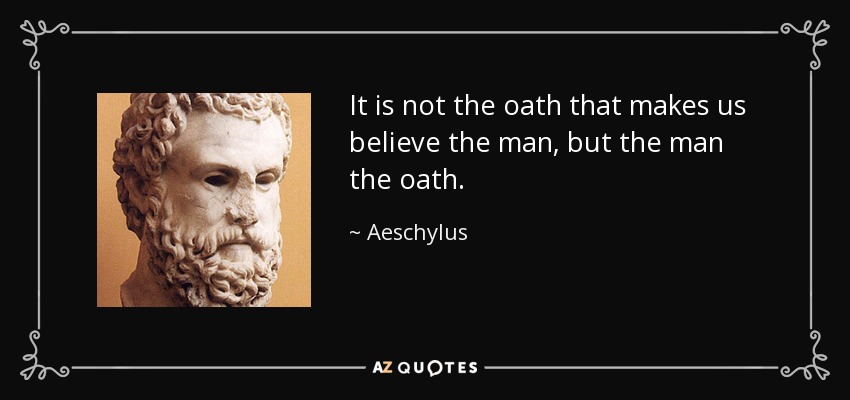Oath: Any type of attestation by which an individual signifies that he or she is bound in conscience to perform a particular act truthfully and faithfully; a solemn declaration of truth or obligation. An individual's appeal to God to witness the truth of what he or she is saying or a pledge to do something enforced by the individual's. Oath Keepers is a non-partisan association of current and formerly serving military, police, and first responders, who pledge to fulfill the oath all military and police take to “defend the Constitution against all enemies, foreign and domestic.”. Young man swearing an oath, crossing his fingers in his back. A young man in suit swearing an oath, rising his right hand, crosses his fingers in his back. Hands taking in school. Boy Scouts Oath. Controversy continues as the Boy Scouts of America is deciding whether or not to allow homosexual leaders and scouts to join the 100 year.
Oath Man Meaning
Also found in: Thesaurus, Encyclopedia, Wikipedia.
Othman
(ˈɒθmən; ɒθˈmɑːn)Ot•to•man
(ˈɒt ə mən)adj., n., pl.
 -mans.adj.
-mans.adj.  2.
2. Oath Man To A King
Want to thank TFD for its existence? Tell a friend about us, add a link to this page, or visit the webmaster's page for free fun content.
Link to this page:
“The Senators and Representatives before mentioned, and the Members of the several State Legislatures, and all executive and judicial Officers, both of the United States and of the several States, shall be bound by Oath or Affirmation, to support this Constitution; but no religious Test shall ever be required as a Qualification to any Office or public Trust under the United States.”
— U.S. Constitution, Article VI, clause 3
About this objectSpeaker of the House, Joseph Cannon of Illinois takes the oath of office at the opening of the 59th Congress (1905—1907).
 Oaths of office and allegiance have been features of government for centuries. When the United States were colonies of Great Britain, officials swore allegiance to the king. Colonial and state legislatures also created oaths that required members to swear allegiance to the state and often profess a belief in God as well. Today, Members of the House take an oath to uphold the Constitution in a group swearing-in on the House Floor on the opening day of a new Congress. Often, they pose for ceremonial photos individually with the Speaker following the official swearing-in.
Oaths of office and allegiance have been features of government for centuries. When the United States were colonies of Great Britain, officials swore allegiance to the king. Colonial and state legislatures also created oaths that required members to swear allegiance to the state and often profess a belief in God as well. Today, Members of the House take an oath to uphold the Constitution in a group swearing-in on the House Floor on the opening day of a new Congress. Often, they pose for ceremonial photos individually with the Speaker following the official swearing-in. Constitutional Framing

When the subject of an oath arose during the Federal Constitutional Convention, the founders were divided. Should an oath be required in a free country at all? And, should state officials swear allegiance to the federal Constitution or should federal officials swear to uphold state constitutions as well as the U.S. Constitution?
Delegate James Wilson of Pennsylvania viewed oaths as “left handed security only” and that “a good government did not need them and a bad one could not or ought not to be supported.” The lexicographer and political writer Noah Webster called oaths “instruments of slavery” and a “badge of folly, borrowed from the dark ages of bigotry.” Both Wilson and Webster argued that people would be naturally inclined to support just governments so oaths were unnecessary. Many others thought such concerns were overwrought. In his 1833 Commentaries on the Constitution, Supreme Court Justice Joseph Story wrote that requiring oaths for government officials “would seem to be a proposition too clear to render any reasoning necessary in support of it.”
Federalism also factored into early debates on the nature of oaths of office. Anti-Federalists were concerned about state officials having to swear to uphold the federal constitution while federal officials were not required to respect state constitutions. In Federalist 44, James Madison of Virginia argued that federal officials lacked the power to uphold state constitutions but that state officials played an important role upholding the U.S. Constitution. In particular, Madison said the administration of elections to federal offices, namely the President and Senate, depended on state legislatures.
The Form of the Oath
The founders decided to require an oath for federal and state officials—absent a religious test—in the Constitution, but the specifics—such as the wording of the oath—were left to the First Congress (1789–1791). In its first act, Congress specified the wording: “I, A.B. do solemnly swear or affirm (as the case may be) that I will support the Constitution of the United States.” This oath was used for all federal officials except the President, whose oath was prescribed specifically in the Constitution (Article II, section 1, clause 8).
The form of the oath has changed several times since that first act of Congress. During the Civil War, Congress mandated that the oath bar from office anyone who had been disloyal to the Union. Eventually, those elements of the “iron-clad” oath were dropped during revisions in 1868, 1871, and 1884. The oath used today has not changed since 1966 and is prescribed in Title 5, Section 3331 of the United States Code. It reads: “I, AB, do solemnly swear (or affirm) that I will support and defend the Constitution of the United States against all enemies, foreign and domestic; that I will bear true faith and allegiance to the same; that I take this obligation freely, without any mental reservation or purpose of evasion, and that I will well and faithfully discharge the duties of the office on which I am about to enter. So help me God.” In contrast to the presidential oath, where it’s used only by tradition, the phrase “so help me God” has been part of the official oath of office for non-presidential offices since 1862.
Current Practice
Oath Management
Representatives usually take their oath during the first day of a new Congress, when the House organizes itself. After the Speaker is elected, the Member with the longest continuous service (the Dean of the House) administers the oath to the Speaker. This tradition originated in the British House of Commons, and has been the practice in the U.S. House since at least the 1820s (the Oath Act of 1789 did not mandate it). The Speaker, in turn, administers the oath to the rest of the Members en masse. The Speaker or Speaker Pro Tempore must swear in members who miss the mass swearing-in ceremony on the first day afterward; on rare occasions, the House has authorized other Members or local judges to swear-in absent Representatives.
The current practice for swearing-in Members is an innovation of Speaker Nicholas Longworth of Ohio, who abandoned the practice of Members taking the oath by state delegations in 1929. Longworth altered the practice because he hoped the mass swearing-in would better “comport with the dignity and solemnity” of the ceremony and, according to some historical accounts, to avoid a potential attempt to challenge the seating of Oscar De Priest of Illinois, the first African American elected to Congress in the 20th century. While subsequent Speakers went back to the original method, in 1937 Speaker William B. Bankhead chose to return to the en masse swearing-in and this has remained the practice. Since the 80th Congress (1947–1949), Members have also been required to sign an oath, which is held by the Clerk of the House.
For Further Reading
5 U.S.C. §3331
2 U.S.C. §25
“Article 6, Clause 3,” The Founders’ Constitution, http://press-pubs.uchicago.edu/founders/tocs/a6_3.html (accessed 13 April 2012).
Bickford, Charlene Bangs, Kenneth R. Bowling, Helen E. Veit, eds. Debates in the House of Representatives: First Session April–May 1789. Volume X. (Baltimore: The Johns Hopkins University Press, 1992).
Bickford, Charlene Bangs, Helen E. Veit, eds. Legislative Histories. Volume VI. (Baltimore: The Johns Hopkins University Press, 1992).
Deschler’s Precedents of the House of Representatives of the United States. Chapter 2. (Washington, D.C.: Government Printing Office, 1976–1977).
Hinds’ Precedents of the House of Representatives of the United States. Chapter V. (Washington, D.C.: Government Printing Office, 1907–1908).
Madison, James, Alexander Hamilton, John Jay. The Federalist Papers. (New York: Penguin Books, 1987).
